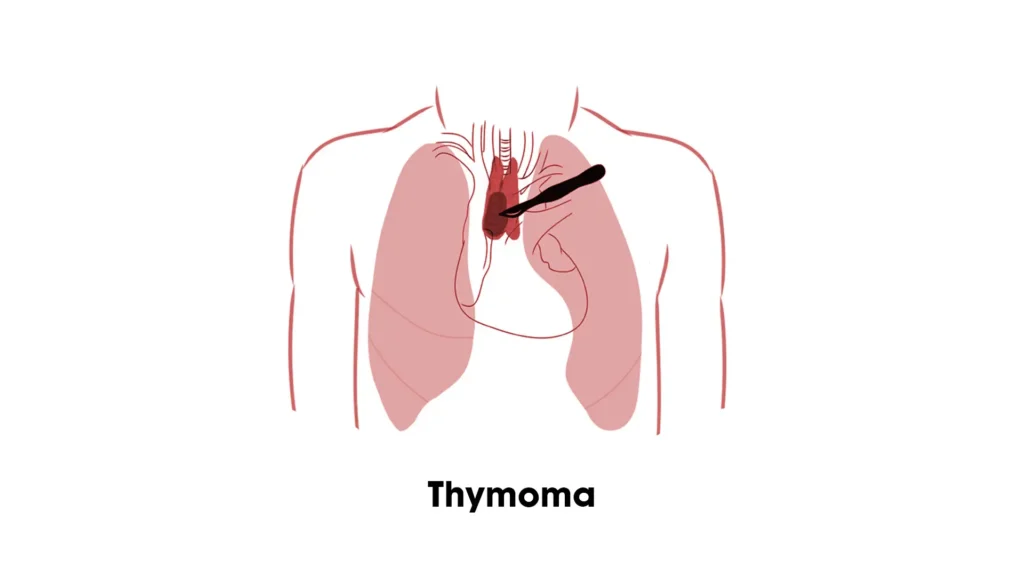Dr. Shilpa Gandhi | Leading Consultant Minimally Invasive Thoracic Surgeon In Nagpur
Meet Our Doctor
Dr. Shilpa Gandhi
MBBS, DNB General Surgery DNB Thoracic Surgery
Dr. Shilpa Gandhi is a trusted and experienced healthcare professional known for her compassionate care and expertise. Committed to delivering personalized treatments and improving patient well-being.


Surgery For Thymoma
Thymoma is a rare tumor that originates in the thymus gland, an organ located in the chest behind the breastbone. While thymomas are often benign, they can sometimes be malignant and lead to serious health complications. The primary treatment for thymoma is surgery, and it plays a crucial role in both the management and potential cure of the disease. In this article, we will explore the various aspects of surgery for thymoma, including what it involves, the benefits, risks, and post-surgery recovery.
What is Thymoma?
Thymoma is a tumor that develops in the thymus, which is a part of the lymphatic system. This gland is responsible for producing T-cells, which are vital for the immune system’s defense against infections. Thymomas can vary in size and can be classified as either benign (non-cancerous) or malignant (cancerous). The symptoms of thymoma can be subtle, but when present, may include chest pain, cough, shortness of breath, or even weight loss. In some cases, thymomas are discovered incidentally during imaging tests for other conditions.
Surgical Treatment for Thymoma
Surgery is considered the most effective method for treating thymoma, especially when the tumor is localized and has not spread to other parts of the body. The primary goal of surgery for thymoma is to remove the tumor in its entirety and restore normal function to the thymus gland, if possible.
Types of Surgery for Thymoma
Thymectomy: The most common surgical procedure for treating thymoma is thymectomy, which involves the complete removal of a thymus gland. This can be done through traditional open surgery or using a minimally invasive approach. In some cases, if the tumor is confined to one area of the thymus, only partial removal may be needed.
Open Surgery: In more extensive cases, where the tumor is larger or has spread, surgeons may opt for open surgery. This involves making a larger incision in the chest to gain access to the thymus gland.
Minimally Invasive Surgery: With advances in technology, many patients are candidates for minimally invasive surgery, such as video-assisted thoracoscopic surgery (VATS) or robotic surgery. These techniques allow for smaller incisions, reduced pain, and faster recovery times.
Lymph Node Dissection: If there is concern that the cancer may have spread, the surgeon may also remove nearby lymph nodes for biopsy.
Benefits of Surgery for Thymoma
- Complete Tumor Removal: Surgery offers the best chance for complete removal of the tumor, which is critical for long-term survival.
- Prevention of Recurrence: By removing the thymoma, surgery significantly reduces the risk of recurrence or metastasis, especially in benign cases.
- Improved Symptom Relief: Surgical treatment often leads to significant relief of symptoms such as chest pain and breathing difficulties.
- Minimal Impact on Daily Life: With successful surgery, many patients return to a normal life, with minimal long-term side effects.
Risks and Considerations of Thymoma Surgery
Like any surgery, surgery for thymoma carries certain risks and potential complications. These include:
- Infection: Any surgery carries the risk of infection, though this can often be minimized with proper care.
- Bleeding: The proximity of the thymus to the heart and major blood vessels can make bleeding a potential risk.
- Damage to Nearby Structures: Since the thymus is located near vital structures like the heart, lungs, and blood vessels, there is a slight risk of damage to these during surgery.
- Anesthesia Risks: As with any surgery that requires general anesthesia, there are risks related to the patient’s overall health and reaction to the anesthesia.
Why is Surgery the Preferred Treatment for Thymoma?
Surgical resection remains the cornerstone of treatment for thymomas. It offers several significant benefits that make it the most preferred method, including:
- Complete Tumor Removal: Surgery allows for the complete excision of the tumor, which can potentially lead to a cure, particularly in benign cases.
- Prevention of Recurrence: By removing the tumor, surgery reduces the likelihood of recurrence and metastasis, especially in malignant thymomas.
- Symptom Improvement: Thymomas can cause symptoms like chest pain, cough, or difficulty breathing. Surgical removal can help alleviate these distressing symptoms.
- Increased Survival Rates: For patients with localized thymomas, surgery improves the chances of long-term survival, especially when performed early in the disease process.
Post-Surgery Care and Recovery
The recovery process after thymoma surgery depends on the type of surgery performed and the overall health of the patient.
- Hospital Stay: Patients typically stay in the hospital for a few days after surgery to monitor for complications and manage pain.
- Pain Management: Pain management is a critical part of recovery, and most patients experience only mild discomfort after minimally invasive procedures.
- Follow-Up Care: Regular follow-up appointments are essential to monitor the patient’s recovery and check for signs of recurrence. Imaging tests like CT scans or MRIs may be conducted to ensure that all tumor tissue has been removed.
- Physical Rehabilitation: Some patients may require physical therapy to help regain strength and mobility, especially after open surgery.
Conclusion
Surgery for thymoma is a critical step in managing and treating this rare tumor. With early diagnosis and timely surgical intervention, patients have an excellent chance of full recovery and improved quality of life. Whether through traditional open surgery, minimally invasive techniques, or robotic-assisted surgery, surgical treatment offers the most effective solution for thymoma patients.
If you or a loved one is facing a diagnosis of thymoma, consult with an experienced thoracic surgeon or oncologist to understand your treatment options. Early surgical intervention is key to achieving the best possible outcome and ensuring a healthier future.



